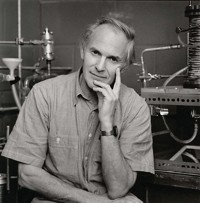Advertisement
Grab your lab coat. Let's get started
Welcome!
Welcome!
Create an account below to get 6 C&EN articles per month, receive newsletters and more - all free.
It seems this is your first time logging in online. Please enter the following information to continue.
As an ACS member you automatically get access to this site. All we need is few more details to create your reading experience.
Not you? Sign in with a different account.
Not you? Sign in with a different account.
ERROR 1
ERROR 1
ERROR 2
ERROR 2
ERROR 2
ERROR 2
ERROR 2
Password and Confirm password must match.
If you have an ACS member number, please enter it here so we can link this account to your membership. (optional)
ERROR 2
ACS values your privacy. By submitting your information, you are gaining access to C&EN and subscribing to our weekly newsletter. We use the information you provide to make your reading experience better, and we will never sell your data to third party members.
People
Nobel Laureate Harry Kroto dies at 76
Codiscoverer of the buckyball was also known for his efforts in science advocacy
by Bethany Halford
May 4, 2016
| A version of this story appeared in
Volume 94, Issue 19

Harold W. Kroto, a chemist and science advocate who shared the 1996 Nobel Prize in Chemistry, passed away on April 30.
Kroto, along with Richard Smalley and Robert Curl, garnered the Nobel Prize for the discovery of buckminsterfullerene—a soccer-ball-shaped molecule of 60 carbon atoms also known as a buckyball. The discovery was greeted with both enthusiasm and skepticism, noted the Nobel Prize committee when announcing the 1996 prize: “No physicist or chemist had expected that carbon would be found in such a symmetrical form other than those already known.”
After winning the Nobel Prize, Kroto devoted much of his time to fostering the public’s understanding of science. In 1995, he helped establish the Vega Science Trust, a producer of television and Internet videos with the goal of providing “a brightly lit platform for scientists to communicate with an authentic voice directly to the public, without media interference, on topics that excite them and on issues that concern them,” he told C&EN in an interview in 2002. Later, Kroto founded the Global Educational Outreach for Science, Engineering & Technology initiative, or GEOSET, dedicated to collecting freely accessible online educational material.
“Harry very much became the embodiment of the hopes of Alfred Nobel, with a better, more peaceful world being brought about through the dissemination of science,” says Thomas Albrecht-Schmitt, a chemistry professor at Florida State University, where Kroto worked since 2004. “He had very high ideals and challenged everyone he engaged to discover what their own ideals are and to become better people.”
“My advice is to do something which interests you or which you enjoy,” Kroto wrote in his Nobel autobiography, “and do it to the absolute best of your ability. If it interests you, however mundane it might seem on the surface, still explore it because something unexpected often turns up just when you least expect it. With this recipe, whatever your limitations, you will almost certainly still do better than anyone else.”




Join the conversation
Contact the reporter
Submit a Letter to the Editor for publication
Engage with us on Twitter